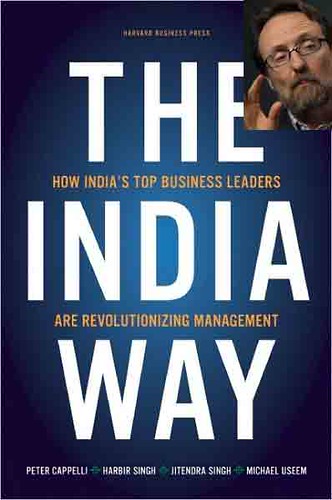 Peter Cappelli is the Director – Center for HR at The Wharton Business School. He has been teaching at Wharton since 1985. Prior to Wharton he taught at the University of California, Berkeley; University of Illinois; Massachusetts Institute of Technology. Peter along with Harbir Singh, Jitendra Singh & Michael Useem have authored a very insightful book The Indian Way – How India’s Top Business Leaders Are Revolutionizing Management and of course his model of what he terms as Talent on Demand. He has been a thought leader in the area of Talent Management. His recent study done for PWC stirred up a lot of HR professionals. (If you haven’t read it, you should and share it with your HR team as well the business leaders.) The last para of the study was quite dramatic with Cappelli saying
Peter Cappelli is the Director – Center for HR at The Wharton Business School. He has been teaching at Wharton since 1985. Prior to Wharton he taught at the University of California, Berkeley; University of Illinois; Massachusetts Institute of Technology. Peter along with Harbir Singh, Jitendra Singh & Michael Useem have authored a very insightful book The Indian Way – How India’s Top Business Leaders Are Revolutionizing Management and of course his model of what he terms as Talent on Demand. He has been a thought leader in the area of Talent Management. His recent study done for PWC stirred up a lot of HR professionals. (If you haven’t read it, you should and share it with your HR team as well the business leaders.) The last para of the study was quite dramatic with Cappelli saying
” …perhaps HR leaders do not need experience outside of HR to play an important role in business decisions because understanding of such decisions is now so much more widespread. Even a decade ago, the idea that one should consider operational decisions based on their return on investment was novel: Now it is commonplace. For better or worse, the top HR role appears to have become more of an internal affair.”
New York Times has his four tips on Talent Management for organizations to follow.
“A deep bench of talent is expensive. So undershoot what will be needed, and plan to hire from the outside. Second, recognize that “uncertainty in demand” for talent is a given, and respond by training smaller classes of managers more often and creating a company-wide pool of talent, instead of developing depth in individual departments. Third, increase the return on the training investment by persuading employees to work voluntarily on stretch assignments, the rationale being that they will gain skills that will make them more valuable in the future. Finally, give employees a greater say in their career paths so that they do not feel frustrated by what the company has mapped out for them and be tempted to leave.”
I asked him a few questions about what he would advise HR professionals at the entry level and also the experienced ones. Read on for more.Abhijit: The term “Business Partner” has been around for a while. What role do you see Human Resources professionals playing in today’s organizations?Peter Cappelli: The “business partner” idea came about because the traditional tasks of HR just didn’t seem very important in the downsizing era of the 1980s and early 1990s. So there was a hunt to find something that would create more influence with the leadership. And that quite appropriately turned to thinking about how HR can help support overall business strategy.That’s still important, but for most companies now the “core” HR topics of recruiting and retention, developing leaders, supporting motivation and engagement are of central importance. The key difference is to be able to justify those programs in financial terms, which is now the language of business.Abhijit: How have your research interests evolved over the years?Peter Cappelli: I think it is important to work on topics that matter. We’re not curing cancer in the social sciences, so it is important to try to understand practical issues. I tend to follow those issues.Abhijit: Who are the people who have influenced your way of thinking?Peter Cappelli: Increasingly I’ve been interested in people working in fields like operations research, who study types of common problems and produce solutions that might be applicable in many situations. Abhijit: For those who have just started their career as a HR professional, what skills should they focus on building and how can they acquire those skills?Peter Cappelli: The most straight-forward skill is to understand finance and accounting as a way to explain HR pratices and link them to the broader business community. My own sense is that what HR leaders do now should be the same as what all leaders in the company do, and that is to diagnose and solve problems. Anything you can learn about how to do that clearly – much of the quality improvement programs teach this – is great.The more one can learn about other functions the better, of course, but for those who aspire to operating management at some point, the key is to get experience running something and get it early on.Abhijit: What would be your advice for HR professionals who have spent more than 15 years in HR – what skills should they acquire and would their method of learning these be different?Peter Cappelli: The goal is to make sure you understand what is going on in business, what are the issues the operating executives are facing, so that we can align what we’re doing to that. Those issues change a lot over time, so keeping up to date with business is key. Executive education programs are a quick way to do this. Skip the HR programs and go right to the business programs.Abhijit: What are some ways in which Human Resources professionals always stay current and relevant?Peter Cappelli: I’d say it is important to keep up to date with broader business concerns. It also helps to have some general sense of what is trendy in HR. Most of these hot topics never go anywhere, but the leadership of the business expects you to keep an eye on them.Abhijit: How do you see the role of the Leadership Development function evolving in this context?Peter Cappelli: This is complicated question because we are trying to prepare leaders for an uncertain future. The big change that leadership development has to address is how to manage that uncertainty: We can’t be sure what the jobs will demand in five years, and we can’t be sure that our current “pipeline” will even be here in five years. We have to get smarter about managing uncertainty, which means learning to become more adaptive and responsive as well as managing the costs associated with uncertainty (e.g., what does it cost if we develop leaders for a profile that turns out to be irrelevant)?Abhijit:What are the kind of things you read, your favorite websites and the kind of people you meet to get your ideasPeter Cappelli: It’s most interesting to read primary material on what employers are doing. Sometimes that comes from journalists, sometimes from cases.Abhijit: What are your hobbies? What do you do to rejuvenate yourself professionally?Peter Cappelli: Not sure I have any real hobbies. I find work pretty interesting.————————-To know about other books by Peter Cappelli click hereWatch him talk about how to manage older workers – esp when they are old enough to be your parents. Here is the video


Leave a Reply